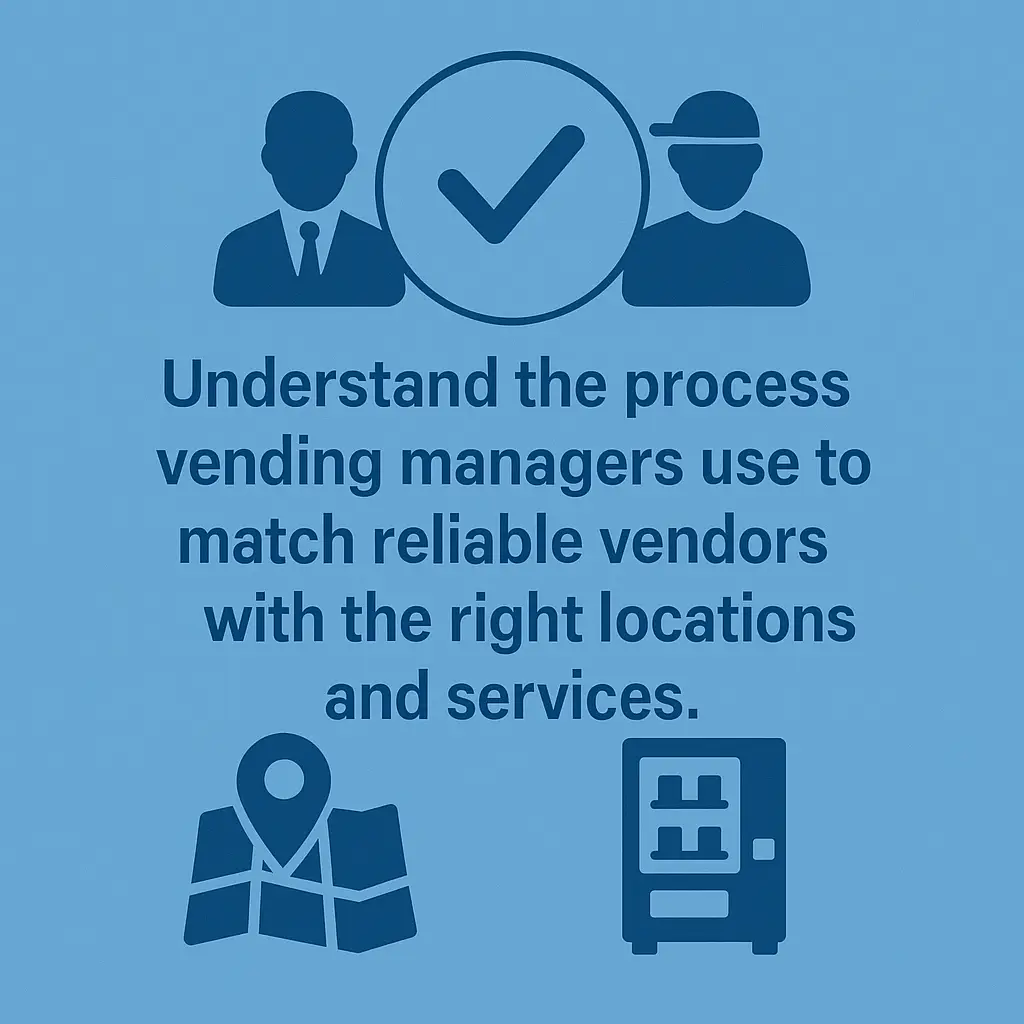How Vending Management Companies Select Vendors
Understand the process vending managers use to match reliable vendors with the right locations and services.
Back to Vending Management Companies ResourcesUnderstand the process vending managers use to match reliable vendors with the right locations and services.
Back to Vending Management Companies ResourcesVending management companies assess vendors on machine quality, stocking regularity, responsiveness, and technology capabilities. Using operator history, service logs, and customer feedback, they ensure reliable placements tailored to business needs.
![]() Vendor selection relies on machine type and service reliability
Vendor selection relies on machine type and service reliability
![]() Smart vending tech is preferred by management companies today
Smart vending tech is preferred by management companies today
![]() Performance data influences ongoing vendor relationships
Performance data influences ongoing vendor relationships

Vending management companies play a key role in ensuring businesses and institutions get vending solutions that are reliable, modern, and tailored to their needs. The vendor selection process is more than a simple match—it’s a strategic approach to minimize issues like service delays, expired products, and equipment failure.
To start, management firms evaluate vendor performance using a combination of experience, machine quality, and responsiveness to service requests. A proven track record in timely stocking, maintenance, and modern machine technology is crucial. Many companies today demand smart vending capabilities—such as contactless payment and real-time inventory tracking—which means vendors with outdated technology are often overlooked.
Another key factor is matching vendor specialization with the needs of the site. For example, a tech startup may require combo machines with healthy snacks and energy drinks, while a school may prioritize water, affordable snack options, and straightforward layouts. Management firms gather site requirements to ensure vending providers are equipped to deliver not just machines—but the right kind of variety for location-specific demand.
Vendor evaluation also includes analyzing service history. If a vendor has high complaints for broken machines or restocking delays, they are less likely to be matched again. Performance is continuously monitored after installation as well to ensure consistency in service delivery.
Many vending management firms now operate under either standard referral or full-service management models. In the latter, they handle vendor relationships on behalf of the facility, allowing the business to remain hands-off while maintaining high performance standards from the vendor.
This detail-focused approach results in dependable vending operations for offices, schools, and commercial properties alike.
Learn how emerging tools are influencing this process in our article on frictionless vending solutions. You can also explore vending setups favored by tech-forward offices.
If you're exploring vending options for your business, Vending Exchange can help simplify the process. Delivery, Installation and Equipment is provided at no cost to you - vendors provide the machines, keep them stocked, and handle all servicing. Whether you need a provider or full-service management, just fill out the form on this page to get started.
They assess vendor history, response times, product freshness, and machine condition to ensure quality service.
Vendor quality depends on location needs, machine requirements, and the pool of available qualified vendors in the area.
Management companies track performance and remove vendors who consistently fail on restocking, maintenance, or customer satisfaction.
Yes, smart vending tech and contactless payment are prioritized to ensure modern, user-friendly experiences.
Absolutely. Management companies collect location preferences up front and select vendors who support those product needs.
Yes, managers choose vendors with inventory and protocols suited to each environment, such as youth-safe beverages in schools.
Most installations are completed within 7 days once a match is finalized and logistics are confirmed.
Yes, many businesses turn to management firms when replacing unreliable or outdated vendors.
Management companies take space constraints into account and often recommend compact combo or stackable machines.
Yes, service incidents are monitored, and vendors must respond promptly or risk being replaced.